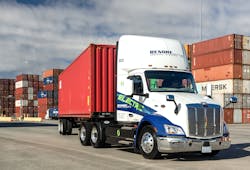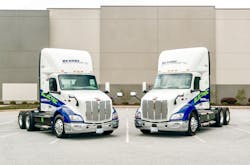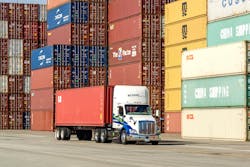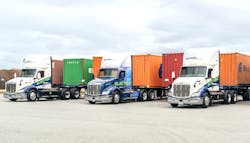Class 8 EVs found their perfect fit in this Southeast fleet
About the Fleet
- Benore Logistic Systems
- HQ: Erie Township, Michigan
- FO 500: For-Hire: No. 213
- Type: General Freight hauler
Dennis Kunz has a passion for sustainability. A native of Germany, Kunz said eco-friendly practices have played a significant role in his life since he was a kid. “It’s just something we do,” he told FleetOwner. That passion for sustainability spills over to his job.
Kunz is the VP of revenue strategy and operation development at Benore Logistic Systems and leads the company’s sustainability department. Benore, which is No. 213 on the 2023 FleetOwner 500: For-Hire list, services OEMs and Tier 1 suppliers, hauling vehicle parts across the Southeast and up the Interstate 75 corridor to Michigan. Its fleet consists of about 580 Class 8 trucks, three of which are electric. These Class 8 EV tractors operate out of Benore’s Greer, South Carolina, facility.
Most of Benore’s customers have strong sustainability goals, and Kunz said adding EVs sets Benore apart from other carriers by demonstrating to customers that “we're pulling in the same direction as they are. Plus, we, as a company, believe that it's the right thing to do.”
See also: Orange EV blossoms in Kansas City
The process of adding EVs to the fleet
Implementing three Class 8 EVs into its fleet didn’t happen overnight. The company began test runs with a Peterbilt 579EV demonstration unit in May 2021. By June of that year, the company announced it would purchase the EV for routine use in its fleet. In May 2022, shortly after Benore’s EV delivery, FleetOwner reported the company would use the new EV to collect data to determine whether more EVs would work within the fleet.
Benore’s tests and data collection were primarily to see if the company could “operate [an EV] as we would operate a diesel truck,” Kunz said, and the company succeeded. Within a year, Benore ordered two additional Class 8 EVs.
Benore now operates all three electric trucks 24 hours a day, six days a week. This is possible because Benore runs its EVs on specific lanes where the electric powertrain shines.
“We pick up, basically, across the street and a one-way round,” Kunz said. “Or we have a lot of rounds that have one-way distance of less than 20 miles. All these lanes are around our main terminal in Greer, South Carolina, which has proven to be the perfect application for a battery-electric vehicle.”
Aside from charging its EVs at its facility, Benore convinced one of its customers to install a charging station there as well.
“Anytime we do a delivery, and our drivers have some time, [drivers] can plug in for five to 10 minutes as the schedule fits and opportunity charge throughout the day,” Kunz told FleetOwner. “This way, we don't need to charge as long on our side or potentially take the truck out of service [to charge].”
Moreover, opportunity charging enables Benore EVs to run their scheduled routes efficiently, all 24 hours of the day.
See also: Michelin, Benore Logistic test electric last-mile delivery truck
EV implementation requires lawmaker buy-in
Benore previously stated it was the first carrier in South Carolina to add a Class 8 EV to its fleet. As an EV pioneer, Kunz felt like a “lobbyist” when asking for state government support. He talked to the governor’s office, the South Carolina Department of Transportation, and the port authority about zero-emission vehicle funding, charging infrastructure, and more ways the government can help support widespread EV adoption. “It only works if we all pull together,” he said.
Gaining government support proved challenging for Kunz and Benore initially, but a zero-emission future for South Carolina gained momentum after Benore received its test truck.
“Every time we had something to celebrate or something to communicate, we hosted events,” Kunz said. “We invited key people from the state and... our customers to spark the excitement.”
Benore and Kunz continue to engage with the government to push sustainability efforts forward.
“South Carolina has come a long way, and we have a whole sustainability department within the state government,” Kunz told FleetOwner. “I believe we had a little role and played a little part in making all this happen.”
See also: Some small fleets lean into EV benefits as CARB rules loom
However, there is still work to be done. Benore’s involvement with the government has shifted from zero-emission vehicle awareness to ways to support commercial EV adoption.
Benore advocates developing commercial EV charging infrastructure outside the private sector. Having this infrastructure available for commercial use would make commercial EV operations “more convenient” and “financially attractive,” he said.
Moreover, fleets will need funding and grants to offset some of the costs of electric vehicles and the charging infrastructure necessary to operate them.
Kunz said he was working with the state DOT to grant local weight exemptions for Class 8 electric vehicles. However, those exemptions would only be valid on state routes, since federal authority extends to interstates and U.S. highways. Commercial electric vehicles are currently allowed an additional 2,000 lb. of weight.
Advice to fleets that want to electrify
When asked about future fleet plans, Kunz said he’s expecting delivery of four more Peterbilt 579EVs within the next month, but he also made it clear he wants to keep his powertrain technology options open.
“There's a lot of sustainability solutions out there that can reduce your carbon emissions, and depending on how these individual technologies progress, it may change the strategy,” Kunz said, adding that if a more “financially attractive” solution were to become available, “why wouldn’t we switch?”
However, with the Peterbilt 579EV’s proven track record on Benore’s routes and four more on the way, Kunz assured that EVs fit within Benore’s short-haul business “very well.”
For others looking to add EVs to their fleet, Kunz advises working with an OEM first to determine how much range is needed.
“A lot of buyers or equipment buyers out there think the larger the battery the better,” Kunz stated. “But... you may be adding additional cost to your equipment that you will not need in the future.”
Additionaly, he suggested talking to your customers about potentially adding EVs to the fleet. Benore has had positive feedback on EVs from its customers, with some even requesting that an EV be used on their lanes, Kunz said. Having a conversation with customers also allows them to partake in the endeavor to electrify by giving them a chance to install a charging station at their facility or even modify their shipments to accommodate weight restrictions.
See also: EV transition: Fleets 'very worried' about coming decade
Fleets would also benefit from working with someone who has experience with fleet electrification.
“There are so many companies out there now that provide trucking as a service,” Kunz began. “They will advise you on which trucks, and they will even help you finance the trucks so that you have somebody on your hand with experience with this because it's a lot to learn.”
Kunz encouraged fleet leaders looking to enact positive change into their fleets to “find the balance between profitability, sustainability, and people.”
“I think those three pillars are very important,” Kunz told FleetOwner. “Only if they all connect, only then it makes sense, and only then it's going to be successful.”
About the Author
Jade Brasher
Senior Editor Jade Brasher has covered vocational trucking and fleets since 2018. A graduate of The University of Alabama with a degree in journalism, Jade enjoys telling stories about the people behind the wheel and the intricate processes of the ever-evolving trucking industry.




